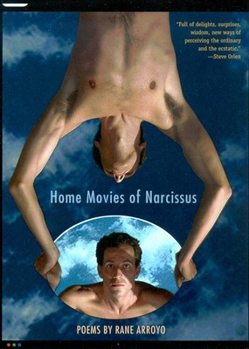Home Movies of Narcissus
A first-generation Latino born in Chicago, Rane Arroyo is a leading poeta puertorriqueño and playwright whose readership transcends his ethnicity. In Home Movies of Narcissus, his fourth collection of poetry, he writes more deliberately and with greater assurance of his search for identity--both cultural/racial and gender/sexual--and his discovery of it within family and community. Using sophisticated language to inspect life from barrio childhood to cosmopolitan manhood, Arroyo explores themes of gay strength and alienation, linked to his experiences as both a Puerto Rican and an intellectual. Through a variety of approaches, he examines a major recurrent Latino paradox: the need to write about Latino issues while being criticized for being too self-centered. Sometimes reserved, sometimes passionate, Arroyo writes with humor and a remarkable quickness of association, moving with a grace that makes seamless use of speech ranging from the formal to the vernacular. Taking in love and sexuality, world literature and history, and the exile's heritage of a shifting geography of identity, he invokes remarkable imagery with language that is economical, fresh, and mischievous. Some of Arroyo's poems take an autobiographical approach and show how poets have both the luxury and necessity of speaking for those in their lives. Others create personas that take in the American experience from a variety of viewpoints--including gays, who are often marginalized by the larger Latino community. "The Ponce de León Poems" pit the poet against a ghost who seeks to direct his writing, while a final section, "The Black Moon Poems," deals with the many sleepless nights that Arroyo has spent struggling with questions over the worth of his art and whether he has betrayed those he loves by writing-or not writing-about them. "In his home movies," he writes, "Narcissus is both the seen and the seer." As Arroyo's insightful words demonstrate, the writer must come to value his own image but not fall in love with it, for it will change, age, and, if he is fortunate, finally grow wise. As readers will discover in Home Movies of Narcissus, Rane Arroyo has seen past the mirror and charted a new territory of self-discovery.
Format:Paperback
Language:English
ISBN:0816521956
ISBN13:9780816521951
Release Date:May 2002
Publisher:University of Arizona Press
Length:77 Pages
Weight:0.35 lbs.
Dimensions:0.3" x 6.1" x 8.4"
Related Subjects
PoetryCustomer Reviews
2 ratings
forbidden, erotic, fun.... a journey that you'll enjoy
Published by Thriftbooks.com User , 19 years ago
Puerto Rican poet and playwright, Rane Arroyo could be introduced with several more identifiers before his name. Perhaps the poet himself would add titles such as Intellectual, Gay, Dreamer, Comedian, American, and Friend. Invoking this multitude of identities, Rane Arroyo's collection of poems, Home Movies of Narcissus, playfully explores realms that are forbidden, imagined, and erotic. There are few borders in Arroyo's writing: his poems seamlessly fuse humor with sincerity as they capture the truths of loneliness, sex, culture, and history. At times merely a stream of consciousness while other times careful constructed stanzas, Arroyo's poems are structured as diversely as the stories which they reveal. Arroyo's poetry artfully recreates its subjects in terms of the emotions that they illicit, not just the linear definitions of or societal reactions to them. Such multi-dimensional reflection and writing are a testament to Arroyo, a poet with strong identities and a deep personal awareness. I think that you will find your own adventure as you read Home Movies of Narcissus. This book of poems reads like a cultural biography of America, featuring a multitude of fascinating worlds and people, both real and imagined. In the first section of the book "Yes, Si, Aha," poems such as "The Cousins" and "Delicious Parable" articulate truths of Arroyo's Puerto Rican identity during the author's childhood and adult years. In the poem "Cousins," Arroyo references his "tropics-starved parents" (9) while recounting a homoerotic conversation among childhood friends. This scene is among countless others in the collection which juxtapose multiple identities, in this case exploring notions of cultural relocation as a Latino and internal exile as a gay adolescent. The reader can only smile as he is left to ponder "Zorro's erection" or a childhood game about "the addict's attic" in the hometown "cha-cha-cha Chicago." Classic poetic devices such as alliteration describe unconventional or even taboo subjects, creating poetry that is both interesting and entertaining to read. Such poems relive moments which border between nostalgia and dysfunction, adding to the lure of Arroyo's dynamic writing. The poem "Delicious Parable" details a poignant sacrifice, an impoverished Puerto Rican mother who struggles to provide a traditional meal for her son. The speaker in the poem cries when he realizes that the dried codfish "with chance bones in it" is the "only inheritance she can give." As he describes the memory, Arroyo's tone is playful yet upfront. He avoids making a political statement about poverty (or any of the other numerous issues in the book). Rather, Arroyo's identity as a poet and his powerful honesty about life experiences (and dreams) awaken the reader without offending him. In the section of poems entitled "The Mask Museum" Arroyo reinvents traditional notions of identity, death, and art. In "Bad Disguises," a clever poem about Hallow
Poetry worth canonizing!
Published by Thriftbooks.com User , 22 years ago
Rane Arroyo has a quality refined by love and talent, which he has released on paper in the form of this collection. His humor, his emotions and his love for words makes him a modern-day legend. I am a fan!





